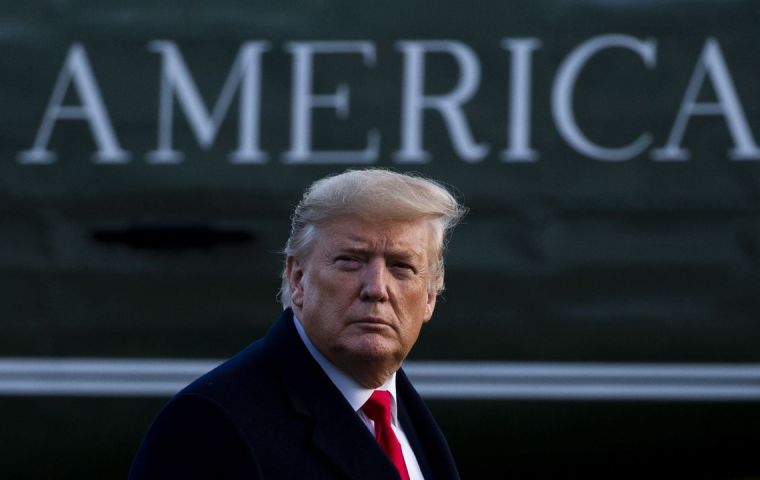MercoPress. South Atlantic News Agency
Trump plans to slash foreign aid and invest funds to counter threats from China and Russia
 Trump seeks to make a 21% cut in foreign aid, which targets US$ 44.1 billion in the upcoming fiscal year compared with US$ 55.7 billion enacted in fiscal year 2020
Trump seeks to make a 21% cut in foreign aid, which targets US$ 44.1 billion in the upcoming fiscal year compared with US$ 55.7 billion enacted in fiscal year 2020 President Donald Trump will propose cutting billions of dollars in U.S. foreign aid in his fiscal 2021 budget while seeking an increase in funds to counter developing economic threats from China and Russia, senior administration officials revealed.
Trump, a Republican, sought in his budget proposal last year to slash foreign aid but faced steep resistance from Congress and did not prevail.
His latest budget, which will be released this week, is a blueprint for his spending proposals that is unlikely, again, to be passed, particularly in an election year.
Trump will seek to make a 21% cut in foreign aid in the proposal, which seeks US$ 44.1 billion in the upcoming fiscal year compared with US$ 55.7 billion enacted in fiscal year 2020, an administration official said.
Aid to Ukraine would remain at its 2020 levels under the new proposal, the official said. Trump was acquitted last week of impeachment charges that he withheld aid to Ukraine to spur Kiev to investigate political rival Joe Biden, a Democratic presidential candidate and former U.S. vice president.
Administration officials said that Trump would request an increase in funding for the U.S. International Development Finance Corporation (DFC) to US$ 700 million compared to US$ 150 million the previous year.
The DFC was formed in large part to counter China’s growing economic influence. It serves as a development bank that partners with the private sector to provide loans in developing countries. It also serves as an alternative financing option to what the United States sees as predatory practices from China.
U.S. officials want to counter the soft power China has wielded with such loans and help countries avoid what they consider Beijing’s “debt trap” diplomacy in which countries give up control ports, roadways or other major assets when they fund infrastructure projects with Chinese loans that they cannot pay back.
“Every country knows the drawbacks of working with autocratic governments,” said Adam Boehler, the DFC’s chief executive, in an interview, listing poor infrastructure as one consequence developing countries faced. “There are very few countries in this world that wouldn’t prefer the American private capital market...That’s what we represent.”
The increased budget funding would help counter economic threats and was in line with Congress’s bipartisan wish the agency would have such resources, he said.
The budget also proposes $1.1 billion for cybersecurity efforts by the U.S. Department of Homeland Security.




Top Comments
Disclaimer & comment rules-

Read all commentsNo change there, then. Foreign aid has always been about spreading US influence...
Feb 11th, 2020 - 10:11 am 0Commenting for this story is now closed.
If you have a Facebook account, become a fan and comment on our Facebook Page!